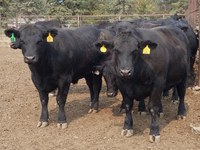2019 North Dakota Angus University Set
(Click the image below to view a high-resolution image that can be downloaded)
Cattle producers will have an opportunity to see how Angus‐sired cattle from their operation perform in a feedlot during the North Dakota Angus University calf feed‐out program this summer and fall.
North Dakota State University’s Carrington Research Extension Center (CREC) is partnering with the North Dakota Angus Association to sponsor the North Dakota Angus University feed-out. This is the eighth year of the program.
Producers can consign steers to the feed‐out program by contacting the CREC. Consigned steers should be at least 50 percent Angus genetics and weigh between 800 and 900 pounds at the time of delivery. Consigned cattle should be delivered to the CREC feedlot the first full week of June (June 3-7).
Producers who consign cattle pay the feeding costs based on the average cost of gain, plus veterinary costs and a modest yardage charge. The CREC will carry the feed, veterinary and yardage costs until the cattle are marketed. After the cattle are marketed, costs and all applicable fees are deducted from the sale price without an interest charge.
Participants in North Dakota Angus University will receive periodic progress reports on their calves’ performance, as well as a final report on the overall performance, efficiency and carcass traits for their calves.
The focus of the 2018 Angus University research was an evaluation of the impacts of bunk management and feeding distillers grains on rumen hydrogen sulfide gas concentrations. Hydrogen sulfide is a product of fermentation in the rumen and has been linked to the onset of polioencephalomalacia. That’s a neurological condition in ruminants resulting from feeding elevated dietary sulfur.
In 2018, calf performance was measured during a 97-day feeding study. Steers had an average daily gain of 4.36 pounds per day and a dry-matter feed conversion of 6.6 (pounds of feed to pound of gain).
This year’s project, which is funded by the North Dakota Corn Utilization Council and North Dakota State Board of Agricultural Research and Education, will be a continuation of last year’s research. The focus of the 2019 research will be to evaluate the impacts of bunk management strategies with two inclusion rates of distillers grains in the diet to determine if the responses observed are similar with greater concentrations of dietary sulfur.
To consign a group of cattle or for more information. contact Bryan Neville, CREC animal scientist, at 701-652-2951 or bryan.neville@ndsu.edu; Karl Hoppe, Extension livestock systems specialist at the CREC, at 701‐652‐2951 or karl.hoppe@ndsu.edu; or Mike Wendel, North Dakota Angus Association program liaison, at 701‐710‐0425.
NDSU Agriculture Communication - April 11, 2019
| Source: | Bryan Neville, 701-652-2951, bryan.neville@ndsu.edu |
|---|---|
| Editor: | Ellen Crawford, 701-231-5391, ellen.crawford@ndsu.edu |


